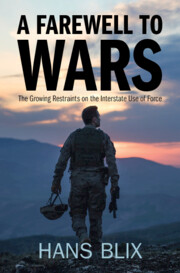Book contents
- A Farewell to Wars
- A Farewell to Wars
- Copyright page
- Contents
- Foreword
- Abbreviations
- 1 Introduction
- 2 Interstate Uses of Force, Tensions and Restraints by Regions since World War II
- 3 Interstate Uses of Force, Tensions and Restraints during Major Phases of International Relations since World War II
- 4 Incentives to the Interstate Uses of Force and Restraints
- 5 Historical Evolution of Norms and Other Means to Restrain the Use of Force
- 6 Overview of Disincentives to and Restraints on the Interstate Use of Force
- 7 Military Strength to Deter Others from Using Force
- 8 Nuclear and Other Non-conventional Weapons and Means as Deterrents and Threats
- 9 Disarmament as Restraint on the Use of Force
- 10 Preventing the Interstate Use of Force by Preventing or Solving Conflicts
- 11 Restraints on the Interstate Use of Force through Legal Norms
- 12 UN Charter Articles Relating to the Use of Force
- 13 The Security Council May Use or Authorize States or Regional Organizations to Use Force
- 14 The Right to Individual and Collective Self-Defence as an Exception to Art. 2:4
- 15 Interventions Triggered by Factors Unforeseen at the Adoption of the Charter’s Ban on the Interstate Use of Force
- 16 Interventions Seeking Regime Change, Protection of People or Punishment
- 17 Findings Regarding the Role of Norms to Restrain the Interstate Use of Force
- 18 States are Saying Farewell to Wars
- Bibliography
- Index
18 - States are Saying Farewell to Wars
Published online by Cambridge University Press: 09 November 2023
- A Farewell to Wars
- A Farewell to Wars
- Copyright page
- Contents
- Foreword
- Abbreviations
- 1 Introduction
- 2 Interstate Uses of Force, Tensions and Restraints by Regions since World War II
- 3 Interstate Uses of Force, Tensions and Restraints during Major Phases of International Relations since World War II
- 4 Incentives to the Interstate Uses of Force and Restraints
- 5 Historical Evolution of Norms and Other Means to Restrain the Use of Force
- 6 Overview of Disincentives to and Restraints on the Interstate Use of Force
- 7 Military Strength to Deter Others from Using Force
- 8 Nuclear and Other Non-conventional Weapons and Means as Deterrents and Threats
- 9 Disarmament as Restraint on the Use of Force
- 10 Preventing the Interstate Use of Force by Preventing or Solving Conflicts
- 11 Restraints on the Interstate Use of Force through Legal Norms
- 12 UN Charter Articles Relating to the Use of Force
- 13 The Security Council May Use or Authorize States or Regional Organizations to Use Force
- 14 The Right to Individual and Collective Self-Defence as an Exception to Art. 2:4
- 15 Interventions Triggered by Factors Unforeseen at the Adoption of the Charter’s Ban on the Interstate Use of Force
- 16 Interventions Seeking Regime Change, Protection of People or Punishment
- 17 Findings Regarding the Role of Norms to Restrain the Interstate Use of Force
- 18 States are Saying Farewell to Wars
- Bibliography
- Index
Summary
A farewell is given to something that is leaving. After thousands of years of freedom for nations to go to war, new proximity, interdependence, risks of nuclear war have led them to exercise restraints and to commit themselves to the UN Charter and the requirement to abandon interstate uses of force. This book concludes that while states will continue as always to compete, the great powers are saying farewell to direct interstate wars. For over 75 years there have been no wars between them and no nuclear weapon has been used. The Charter as rule-based international order has often been violated and the veto has often stood in the way of action. Yet, the General Assembly has asserted the order and declared that it does not recognize illegal annexations. The nuclear arsenals remain and pose existential risks to humanity. At the same time, the fear that they would be used in second strikes makes it implausible that any nuclear-armed states would initiate hostilities that could risk leading to nuclear war. Russia’s aggression in Ukraine is seen as out of tune with the twenty-first century – an aberration. The growing interdependence of states is creating restraints against causing ruptures and, at the same time, enables states to use crippling economic measures as substitutes for the use of force. In 1962, the Cuban missile crisis shocked the parties and prompted them to use diplomacy to avert the acute risk of nuclear war. Today, one may speculate if the war in Ukraine and threats to the human environment might shock nations to turn to diplomacy and disarmament and switch to the defence of the threatened human environment a major part of the some 2 trillion dollars that they now spend annually to defend themselves against each other. For this to become reality, an engaged public mind would be as important as it was against slavery and nuclear weapons.
Keywords
- Type
- Chapter
- Information
- A Farewell to WarsThe Growing Restraints on the Interstate Use of Force, pp. 270 - 296Publisher: Cambridge University PressPrint publication year: 2023



